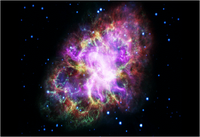Compact Objects and Energetic Phenomena in the Multi-messenger Era

Event Overview

Now, at the dawn of the multi-messenger era, electromagnetic waves, high-energy particles, and gravitational waves are jointly revealing previously-hidden clues into the workings of compact objects. These clues are guiding observers, theorists, and computational researchers to new and deep insights about compact objects. Stunning progress has been made in understanding the energetic mergers, and merger aftermaths, of neutron stars and of stellar-mass black holes. This promises to illuminate evolutionary studies of black holes on all mass scales, whether they are alone, in bound binaries, or merging. And the role of compact objects, like supernovae, pulsars and active galactic nuclei, as Nature's particle accelerators can now be examined widely and in detail. Finally, since size equates to time, insights about compact objects are benefiting hugely from multi-messenger studies in the time domain.
This meeting will emphasize the current state of research on compact objects that leverages on multi-messenger information. The meeting will also be forward-looking to help planners define an interoperable suite of multi-messenger facilities for the 2030s and beyond. An example suite might include SKA, ngVLA, ELTs, Rubin Observatory, Cosmic Explorer/Einstein Telescope, LISA, and IceCube, as well as future X-ray missions.
Previous Meetings
- Radio Millimeter Astrophysical Frontiers in the Next Decade (2019)
- Astrophysical Frontiers in the Next Decade and Beyond: Planets, Galaxies, Black Holes and the Transient Universe (2018)
- Developing the ngVLA Science Program Workshop (2017)








Connect with NRAO